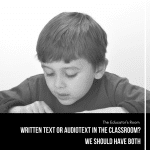[fusion_builder_container hundred_percent=”yes” overflow=”visible”][fusion_builder_row][fusion_builder_column type=”1_1″ background_position=”left top” background_color=”” border_size=”” border_color=”” border_style=”solid” spacing=”yes” background_image=”” background_repeat=”no-repeat” padding=”” margin_top=”0px” margin_bottom=”0px” class=”” id=”” animation_type=”” animation_speed=”0.3″ animation_direction=”left” hide_on_mobile=”no” center_content=”no” min_height=”none”]
No matter how much I prepare for the start of the new school year I still feel a nervous anxiety on the first day of classes similar to the start of a running race. The starter says “go” and I surge forward despite my whispered plea of “not ready.” The masses move at a swift pace while I search for a chance to move into a rhythm I can maintain. I know I have trained for this and I always stay the course. Looking around I see other teachers and students pushing for strong finishes, chances at glory and that moment in the sun. We are in this together and yet we often seem so alone. Training for a fall marathon has me considering the parallels to teaching to the Common Core and the need of greater team spirit.
Running is my metaphor for what will be accomplished this year in teaching at a public high school since both require adherence to planning and routines. Coaching running has taught me to use observations, video and timed workouts in order to help an athlete pinpoint areas of improvement, fine tune their form or add strength to certain muscle groups. The longitudinal data published by all4ed.org on nationwide literacy combined with the Center on Instruction for Reading Research by Florida University provides a similar outline for improvement. These reports isolate literacy deficits by demographics and by specific areas of weaknesses. Subsequent practices that meet a particular level of fluency or reading comprehension are analyzed, modeled and presented. Processing this research while on a 12 mile training run struck me with the realization that while all members of my running team were successfully meeting their goals, that same thing was not really happening in my classroom. The data pronouncing that whole sectors of adolescence were failing in schools across America is blatantly senseless. Athletes are not incapable of running, students are not incapable of learning. Athletes are guided towards defining their own goals and coached towards progress. The same should happen in my classroom.
Fluency and reading comprehension are the overall literacy needs of adolescents in my school. Daily decoding vocabulary as recommended by the Center for Instruction was definitely missing from my current practice. I mentally mapped out intended changes in classroom management while running on a dirt road winding through horse farms and hay fields. Do I offer deliberate routines, are itineraries clearly posted? Do students have flexibility and choice about their engagement within each routine? Students need to know what we are learning and why we are learning it. Admittedly, that has not always been clear. Pinpointing tasks oriented towards incremental improvements was analogous to designing intervals or speed workouts with a focus on what is accomplished not what is failed. I finished my run and dashed off to find the training schedule for my runners.
A direct comparison of my Varsity team’s itinerary to literacy help me visualize the changes to make in my instruction. With runners I set up a weekly schedule and daily targets: Monday is distance, Tuesday, speed, Wednesday, recovery etc. How individuals define these targets vary since distances are interpreted as little as 3 miles or as great as 9. Intensity as a target can depend on the overall race schedule with some weekly mileage totals greater than others. Education follows similar intensity with weeks designated for mandatory testing or statewide performance tasks. It makes sense to focus on daily and weekly routines that are measurable with opportunities for modification. And it makes sense to explain to students that while some practices will be more difficult they will be followed up with rest and recovery.
I mapped my year into 10 day units of block scheduling and sketched in the possible standardized testing times, designated some weeks as easy or hard; each day was specific towards developing fluency, comprehension or performance tasks. Now it was possible to examine the approximate time devoted within each block to vocabulary instruction, read aloud and question, formative assessment or constructed response. I identified content that matched the literacy skills associated with the Common Core and narrowed down the specific terms I expect all students of all abilities to master. Using online applications for etymology and word derivation helped me choose a handful of graphic organizers to consistently use while breaking down a word each day. Starting with a geography term like archipelago was equally difficult for all students but they all were able to break down the syllables, identify the affixes and redefine it in their own words. Each student was able to draw a picture or give an actual example.
As a formative assessment, I put three locations of archipelagos on the bulletin board. requesting that each student locate 2 sites on a map and vote to be exiled to one before exiting the classroom. Results of the assessment helped me address the term again during the next class and incur curiosity about the new word of the day. Within three class days I am publishing the unit vocabulary list on the board and students are self selecting the term they hope to add to their vocabulary notebook. I hope to have summative quizzes available online for students who wish to measure their progress and scaffold their learning similar to the time trials runners rely on at running workouts.
Being on a running team should give athletes a lifelong relationship with a sport. Being in school should give students a lifelong relationship with learning. How learning is defined to some extent must be left up to the students with coaches there to support them. Not every runner will win a race but ever runner will take this sport with them wherever they travel. Sprints, marathons, relays all offer different kinds of excitement, community and adventure. Education has to afford these opportunities if we all intend to stay in the race.
[/fusion_builder_column][/fusion_builder_row][/fusion_builder_container]





